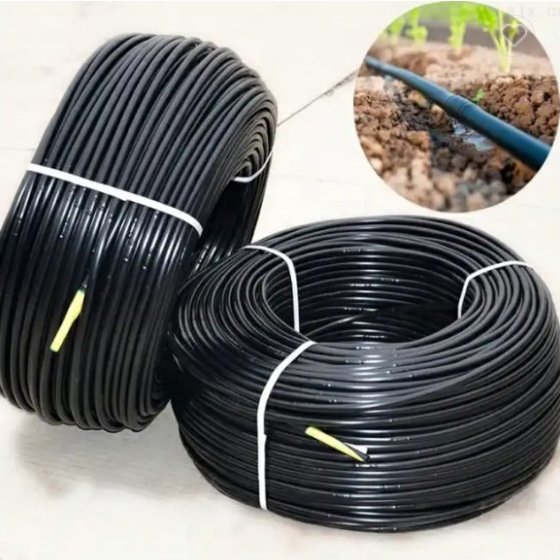

In recent years, with the continuous advancement of agricultural technology, drip irrigation pipes have emerged as an efficient irrigation method, gaining widespread adoption globally, especially in water-scarce regions. Compared to traditional irrigation methods, drip irrigation technology offers significant technical advantages and environmental benefits, making it an ideal solution for modern agriculture.
Efficient Water Use: Tackling Water Scarcity
One of the primary advantages of drip irrigation pipes is their high efficiency in water usage. By delivering water directly to the roots of crops, drip irrigation minimizes evaporation and leakage. Traditional irrigation methods often lead to significant water loss, especially in hot, dry climates. However, drip irrigation technology can achieve the desired irrigation effect with minimal water usage, improving water conservation by 50%-70%. This precision irrigation not only enhances the utilization of water resources but also helps maintain soil moisture and aeration, reducing the risk of overwatering and soil erosion.
This water-saving irrigation method not only reduces water waste but also significantly lowers agricultural production costs. In many regions, farmers who install drip irrigation systems reduce water consumption while achieving higher crop yields, improving both water use efficiency and economic returns. Moreover, drip irrigation pipes can be integrated with smart irrigation systems, using sensors to monitor soil moisture and crop needs, further optimizing irrigation management and enabling automated, precise agricultural production.
Increased Crop Yield and Quality
In addition to conserving water, drip irrigation pipes also contribute to improved crop yield and quality. This system delivers water and nutrients directly to the crop roots, avoiding unnecessary loss of water and fertilizer in the soil. Unlike traditional irrigation methods, drip irrigation pipes can provide water at the right time and in the right amount based on the growth cycle and specific needs of the crop, ensuring that plants receive optimal care during each growth stage.
This precision irrigation is particularly beneficial for high-value crops. Fruits, vegetables, and flowers, which are more sensitive to water, can thrive under the optimal growing conditions provided by drip irrigation, reducing stress and disease caused by inconsistent water supply. Additionally, drip irrigation can prevent issues like root rot caused by overwatering, leading to a more stable and higher-quality harvest. As a result, many farmers have adopted drip irrigation systems as a way to increase profitability, especially when cultivating high-value crops.
Soil and Ecosystem Preservation
Another key advantage of drip irrigation technology is its positive impact on soil health and the environment. Traditional irrigation methods, especially large-scale flood irrigation, can degrade soil structure, increasing the risk of salinization and erosion. Drip irrigation systems, on the other hand, reduce water pooling and excess infiltration, preserving the soil's natural structure and permeability. This helps maintain healthy soil conditions and prevents soil compaction and erosion.
Moreover, drip irrigation helps reduce surface runoff and the pollution of nearby water bodies. In traditional irrigation systems, excess water often carries fertilizers, pesticides, and other inputs into rivers and groundwater, causing pollution and environmental degradation. Drip irrigation's precise delivery of water and nutrients to the crop root zone reduces the use of agrochemicals and limits the spread of non-point source pollution, thereby promoting sustainable farming practices.
Weed Control and Reduced Pesticide Use
Drip irrigation not only minimizes water waste but also helps control the growth of weeds. In traditional irrigation methods, water spreads across the entire field, promoting the growth of both crops and weeds, which increases labor costs and the use of herbicides. Drip irrigation systems, however, deliver water directly to the crop roots, limiting water supply to non-target areas and thereby suppressing weed growth.
This weed control feature offers dual benefits: it reduces the need for herbicides, cutting down on both production costs and the environmental impact of chemicals. Additionally, fewer chemicals mean a healthier agricultural ecosystem.
Adaptability to Different Terrains and Crop Types
One of the most notable strengths of drip irrigation systems is their flexibility and adaptability to various terrains and crop needs. Whether on plains, hills, or mountainous regions, drip irrigation systems can be customized and installed to suit specific conditions. In hilly or mountainous areas, where traditional irrigation methods often struggle due to terrain challenges, drip irrigation pipes efficiently distribute water through low-pressure systems that adapt to uneven landscapes. Furthermore, drip irrigation systems can be used for a wide range of crops, including staple grains, cash crops, and horticultural plants. This adaptability makes drip irrigation pipes an essential tool in diverse agricultural operations.
Longevity and Low Maintenance Costs
Besides technical benefits, drip irrigation systems also offer economic advantages. High-quality drip irrigation pipes are made from corrosion-resistant, UV-resistant materials that can withstand harsh environmental conditions. These systems typically have a lifespan of over 10 years. Compared to other irrigation systems, drip irrigation requires relatively low maintenance—routine cleaning and inspections are usually sufficient to ensure optimal functioning. The long lifespan and low maintenance costs make drip irrigation a highly cost-effective solution for long-term agricultural production.
Conclusion
As an indispensable irrigation technology in modern agriculture, drip irrigation pipes offer significant advantages such as efficient water conservation, improved crop yield and quality, soil and ecosystem preservation, weed control, and adaptability to different terrains. Their widespread adoption has brought about economic benefits for agricultural producers while contributing to global water resource management and environmental protection. As agricultural technology continues to advance, drip irrigation will play an even more critical role in supporting sustainable, efficient farming, helping agriculture transition towards a more eco-friendly and productive future.